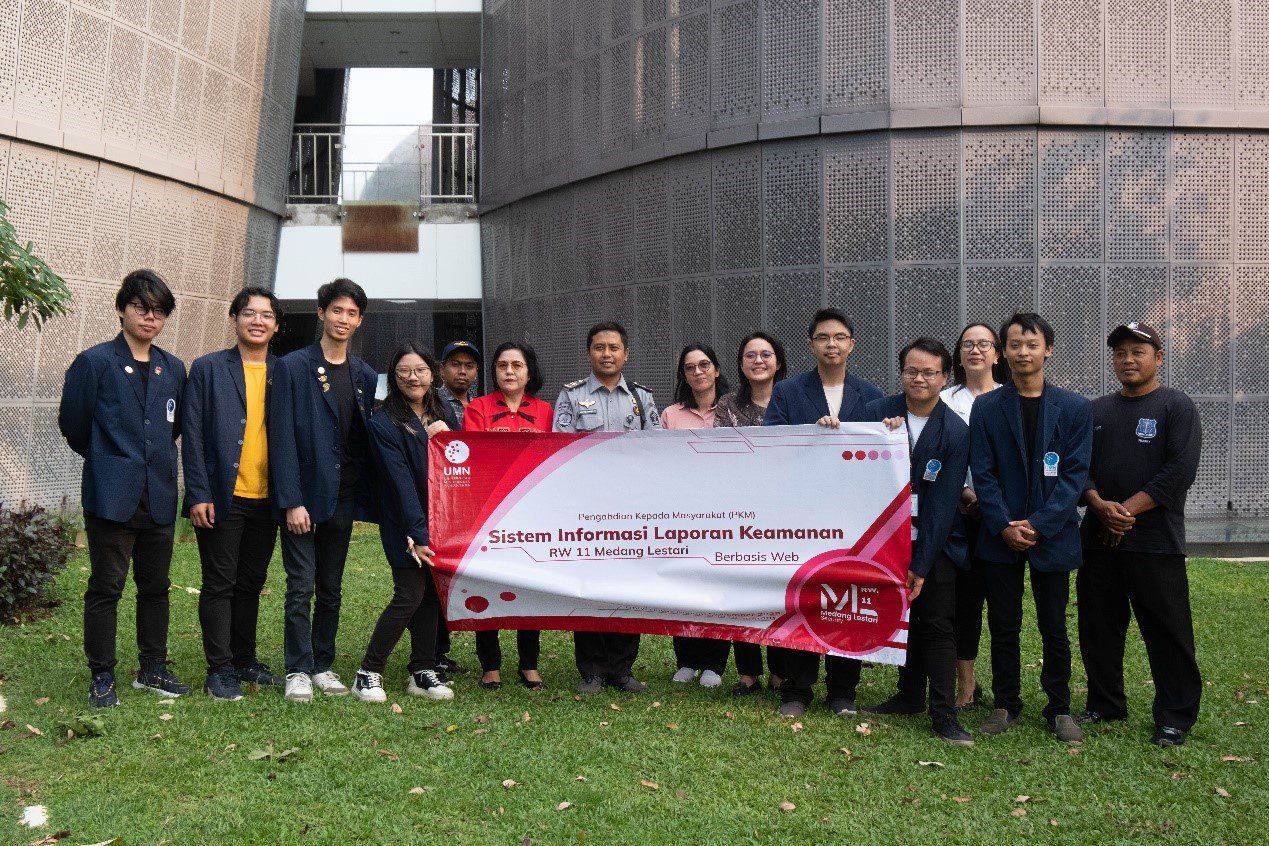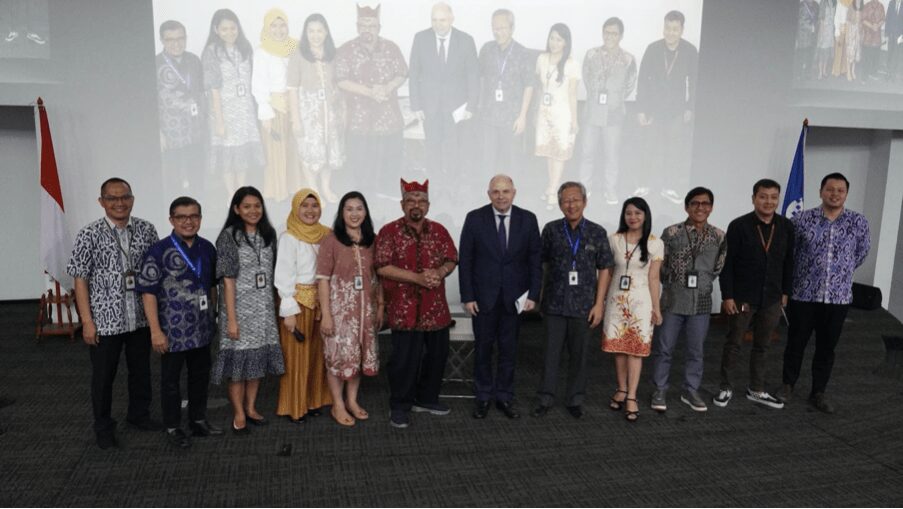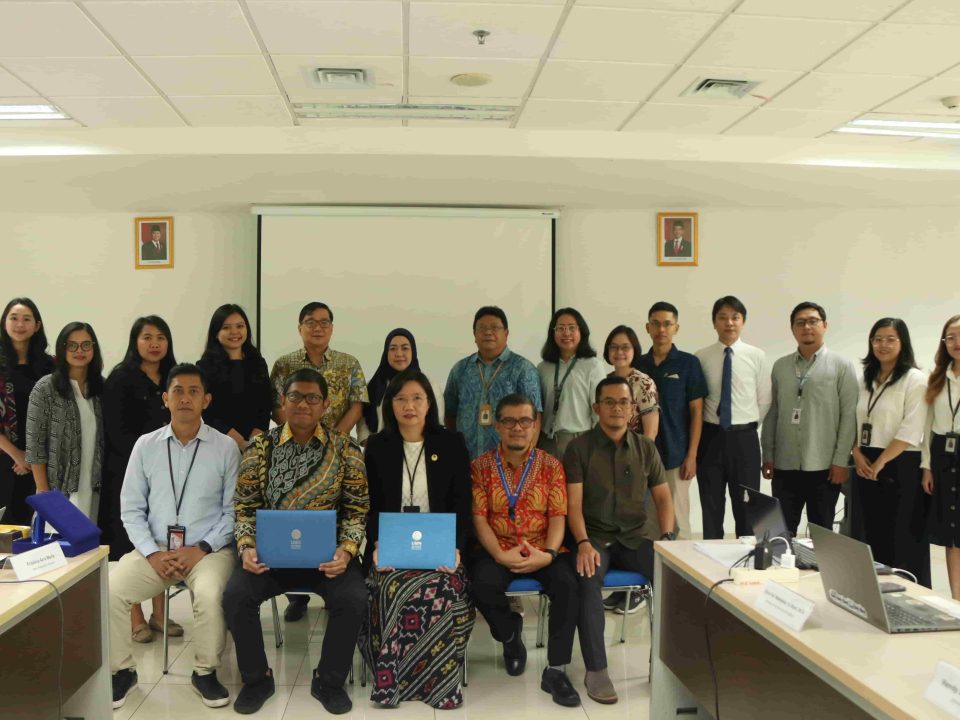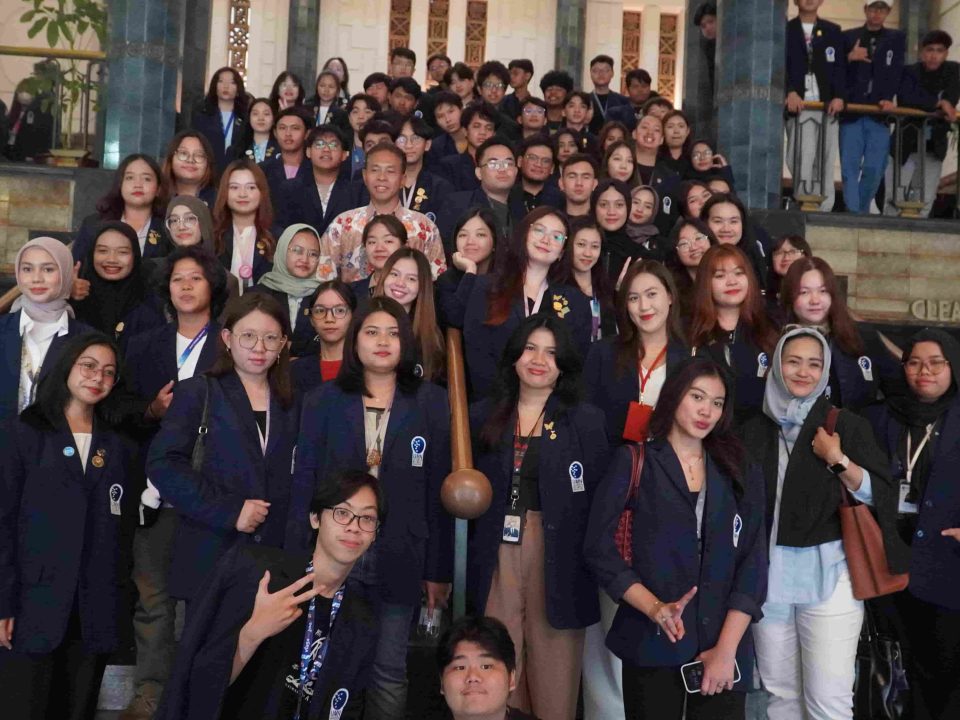
Community Service UMN: Making a Security Report Application for RW 11 Medang Lestari
December 5, 2023
Expanding Learning Horizons at UMN — Now Open to Public!
December 8, 2023UMN Conducts a Guest Lecture with The Deputy Head of Mission of The EU to Indonesia and Brunei Darussalam

UMN Rectorate and Communications Faculty lecturers representatives with Stéphane Mechati, the Deputy Head of Mission of the European Union to Indonesia and Brunei Darussalam. (Doc. UMN Marketing Communications)

UMN Rectorate and Communications Faculty lecturers representatives with Stéphane Mechati, the Deputy Head of Mission of the European Union to Indonesia and Brunei Darussalam. (Doc. UMN Marketing Communications)
TANGERANG – The Communications Faculty of Multimedia Nusantara University (Universitas Multimedia Nusantara/UMN) conducted a guest lecture themed “Election in EU Countries, The Power of Youth and Social Media” on the 29th of November, 2023. The guest lecture invited Stéphane Mechati, the Deputy Head of Mission of the European Union, to Indonesia and Brunei Darussalam as the keynote speaker.
Several UMN leaders and UMN Faculty of Communication lecturers and students attended the guest lecture. Together with Mechati, the guest lecture discussed plenty about the politics and elections in the EU and Indonesia and the power of youth and social media on elections.
“Today, we are going to hear an important lecture from His Excellency ambassador, Mechati. The topic is timely since Indonesia is going to conduct the general elections and the presidential elections in the 14th of February, 2024,” opened Dr. Ninok Leksono, M.A., UMN’s Rector. He then proceeded to welcome Mechati in French.

Dr Ninok Leksono, in his opening speech, welcomed everyone who attended the guest lecture. (Doc. UMN Marketing Communications)
Mechati then proceeded to present and discuss his experience and view regarding the guest lecture’s topic. He shared that next year will be a combination of three major political events in one year. This is an exciting moment for him as this is the first time he will attend elections in Indonesia.
“What I see as an interesting combination is the fact that the executive power of Indonesia will be in place at the moment. In our own European Union, new executive authorities will be supposedly now in place, and at the same time, this will coincide with the presidential elections in the United States,” Mechati said.
2024 Indonesian Elections on Valentine’s Day: I Love You, Indonesia and Democracy!

(Middle) Stéphane Mechati, the Deputy Head of Mission of the European Union to Indonesia and Brunei Darussalam. (Doc. UMN Marketing Communications)
Romantic, the Indonesian 2024 elections will be held on Valentine’s Day. “Last Sunday, I was attending a very interesting meeting and they have asked me if I have a slogan (relating to Valentine’s Day) for the next election because I’m French– or I’m a romantic person,” Mechati said.
“Of course, I have to say I love you to my wife; I have a marvelous wife,” he added, bringing laughter to the room. “I suppose that day, all Indonesian citizens will not only say ‘I love you’ to their partners, but also have the opportunity to say ‘I love you’ to Indonesia– I love you, democracy,” Mechati said.
He emphasized that although romantic words are nice, actions matter most. If you love your country and democracy, you have to vote.
“You have no excuse because you’re very young. You are romantic by definition,” Mechati shared.
Elections in The EU

Stéphane Mechati. (Doc. UMN Marketing Communications)
The European Parliament election will be conducted in June 2024. Elections in Indonesia and the EU are different. Mechati explained that Indonesia is a presidential regime, meaning that the executive comprises the president or the vice president, and the president appoints his ministers directly.
In contrast, France, for instance, has a semi-presidential regime. They elect the President directly, but in parallel, they also elect the lower assembly through general legislative elections with what they call the “National Assembly.” This is equivalent to the “House of Representatives” in Indonesia; so, the legislative power.
“In most European member states, we have a pure parliamentary system. So it means that first, we elect the MPs, the members of the parliament,” Mechati explained.
“But anyway, what matters is to keep in mind that what we got on June 24, we have consequences not only for the 450 million inhabitants, ex-citizens of the European Union, but there will be the adoption of policies which external dimension may, I’m not saying will, but we may produce consequences positive,” Mechati added.
The European Union in Indonesia signed a cooperation and partnership agreement in 2024. Mechati shared that they will celebrate the anniversary next year. With this cooperation, they are engaged in a check-up– a comprehensive economic partnership agreement with possibly an investment element to facilitate market access to the EU market.
“We are a big market; we are a huge market. Actually, we are the biggest market in that respect. So we are very attractive, but we want to defend values, United Nations values, because we own these values very deeply. We want to defend our communications; we are out, and we want to defend our international commitments,” Mechati explained.
“And those international commitments for quite some time are those I have mentioned, values, principles, democracy, energy transition, how to integrate climate change events. And we want to address these issues,” Mechati added.
Know more about the EU elections here.
Youth and Elections: Low Voter Turnover in the EU, How do we Drive Our Youth to Vote?

Stéphane Mechati sees a disconnection between generations and the risk of not addressing the disconnection. (Doc. UMN Marketing Communications)
There are some interesting discussions about youth and elections. The first question discussed is, are some countries’ minimum age of voting too young compared to the education they get about voting?
“For your information, Germany and Belgium, early this year have joined a very respected club of 5 Member States within the Union which will decide to lower the age of votes in from the European Union parliamentary relations to 16. OK, it means that at least two of my teenagers at home could vote, but they are not mature yet, right?” Mechati said.
He was puzzled by this as voting requires knowledge and educational background to know what is at stake. Young people must understand what it means to elect a national representative and a president.
In addition to age, different generations significantly differ in culture and thinking.
“There’s this jet lag in this journey between 2-3 generations. We don’t necessarily speak the same language, we don’t use the same expressions, and therefore, there is a problem of segmenting and all the meanings beyond the words and so this is also about new values,” Mechati said.
He also added how, in the ‘60s and ‘70s, women struggled to have the most basic rights, but now, young people talk about genders in this generation.
“Now my kids are constantly telling me don’t be so gender oriented, Daddy, it’s not necessarily he or she, it can be it or they. I do my best because I think I’m very open-minded, but it’s difficult for me to catch up with you in that respect, right?” he shared.
To put it simply, there is a disconnection between the generations when it comes to actions, culture, and thinking. Therefore, this has consequences on the elections, democracy, debate, and the exchange of ideas. Because beyond candidates, we are supposed to have problems; we are supposed to have ideas, proposals, and visions of the future.

Stéphane Mechati at UMN’s guest lecture. (Doc. UMN Marketing Communications)
He also shared a sad reality of the EU’s relatively low voter turnout (the participation rate of a given election) compared to Indonesia’s. Mechati shared that Indonesia has a high turnout, meaning that Indonesia continues to demobilize and has a good trend.
“But I think that the latest turnout for 2019 was more than 80%; it was 82% something, while in 2014, the turnout was 75%. So, it is quite remarkable,” Mechati shared. He also wishes the EU could take Indonesia as an example to boost voter turnout.
Mechati shared that there was a lot of enthusiasm for voting in the 80s, but it has fallen since then. The main issue seems to be democratic legitimacy. An article by the official European Economic and Social Committee also shared how disinformation and lack of interest are the main reasons for poor voter turnout in European elections.
“…The legality, the results were proclaimed, and the elections were fair, transparent, and had no problem. They were legal but were (the turnout) below 50%. If your turnout is below 50, then you have a problem, and you need to address this problem,” Mechati said.
At the same time, he also reminds the participants to be wise when using social media as a source of information. He emphasized that we all need to remember that opinions are not facts. As intelligent students, we must be able to fact-check and be critical when accepting information online.

UMN Guest Lecture themed “Election in EU Countries, The Power of Youth and Social Media.” (Doc. UMN Marketing Communications)
So, how do we drive our youth to vote? Mechati said the youth needs to have a sense of ownership. This is also a keyword he proposes Indonesia to keep in mind. To have a sense of ownership, there needs to be contribution. He also advised more education about voting for the youth.
There needs to be a curriculum in high school about the different powers, the separation of powers for the sake of citizens, the concept of active contribution, and more. How can young people vote and feel engaged if they know nothing about who they are voting and how much voting can influence the country?
Mechati also mentioned age limits for candidates. He shared how, as a Frenchman, he had the youngest president ever. France’s current president is Emmanuel Macron (45). It seems that younger presidents and other governmental representatives give a better image to youth.
“They feel represented by their father, not by their grandfather, or sometimes their grand-grand-grandfather. So they feel more connected,” Mechati explained. Of course, what matters most is the ideas, maturity, and ability to run the country. Age limits are a common question that needs to be discussed.
Mechati also understands that sometimes, people may abstain from voting because they feel unrepresented. But by doing so, they are declining themselves an important voice and the ability to make an influence.
“If you think voting is not enough, engage in politics. Engage in a political party; create your party, create an association. And if you are sufficiently convincing and gather people that you come up with very good ideas that can be implemented at the national level, for instance, don’t worry,” Mechati advised.

UMN Guest Lecture themed “Election in EU Countries, The Power of Youth and Social Media.” (Doc. UMN Marketing Communications)
There was much more discussion and Q&As in this exciting guest lecture session. We hope this guest lecture inspired students to vote in the 2024 elections. Your vote matters!
By Levina Chrestella Theodora | UMN News Service
English translation by Levina Chrestella Theodora
Kuliah di Jakarta untuk jurusan program studi Informatika| Sistem Informasi | Teknik Komputer | Teknik Elektro | Teknik Fisika | Akuntansi | Manajemen| Komunikasi Strategis | Jurnalistik | Desain Komunikasi Visual | Film dan Animasi | Arsitektur | D3 Perhotelan , di Universitas Multimedia Nusantara. www.umn.ac.id




